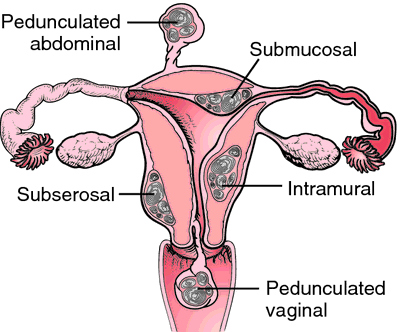Medical term:
fibromyomas
leiomyoma
[li″o-mi-o´mah]a benign tumor derived from smooth muscle, most often of the uterus (leiomyoma uteri).
bizarre leiomyoma epithelioid leiomyoma.
leiomyoma cu´tis one arising from cutaneous or subcutaneous smooth muscle fibers, found singly or multiply, usually as lesions arising from arrectores pilorum muscles; it may also occur as a solitary genital lesion or a solitary angioleiomyoma arising from the muscle of veins.
epithelioid leiomyoma one in which the cells are polygonal rather than spindle shaped, usually found in the stomach. Called also bizarre leiomyoma and leiomyofibroma.
leiomyoma u´teri (uterine leiomyoma) leiomyoma of the uterus; called also uterine myoma and, colloquially, fibroids. It is the most common of all tumors found in women. It may occur in any part of the uterus, although it is most frequently in the body of the organ.
Leiomyomas usually occur during the third and fourth decades, and are often multiple, although a single tumor may occur. They are usually small but may grow quite large and occupy most of the uterine wall; after menopause, growth usually ceases. Symptoms vary according to the location and size of the tumors. As they grow they may cause pressure on neighboring organs, painful menstruation, profuse and irregular menstrual bleeding, vaginal discharge, or frequent urination, as well as enlargement of the uterus.
In pregnancy, the tumors may interfere with natural enlargement of the uterus with the growing fetus. They may also cause spontaneous abortion and death of the fetus.
Small leiomyomas are usually left undisturbed and are checked at frequent intervals. Larger tumors may be removed surgically, sometimes accompanied by a hysterectomy, or medication may be prescribed to induce a temporary menopause.
Leiomyomas usually occur during the third and fourth decades, and are often multiple, although a single tumor may occur. They are usually small but may grow quite large and occupy most of the uterine wall; after menopause, growth usually ceases. Symptoms vary according to the location and size of the tumors. As they grow they may cause pressure on neighboring organs, painful menstruation, profuse and irregular menstrual bleeding, vaginal discharge, or frequent urination, as well as enlargement of the uterus.
In pregnancy, the tumors may interfere with natural enlargement of the uterus with the growing fetus. They may also cause spontaneous abortion and death of the fetus.
Small leiomyomas are usually left undisturbed and are checked at frequent intervals. Larger tumors may be removed surgically, sometimes accompanied by a hysterectomy, or medication may be prescribed to induce a temporary menopause.

Leiomyoma of the uterus. The tumors may be subserosal, intramural, or submucosal. Subserosal and submucosal tumors may be pedunculated and may protrude from the uterine surface or into the uterine cavity, respectively. The stalk of pedunculated tumors may also become twisted. From Damjanov, 2000.
Miller-Keane Encyclopedia and Dictionary of Medicine, Nursing, and Allied Health, Seventh Edition. © 2003 by Saunders, an imprint of Elsevier, Inc. All rights reserved.
fi·bro·my·o·ma
(fī'brō-mī-ō'mă),A leiomyoma that contains a relatively abundant amount of fibrous tissue.
Farlex Partner Medical Dictionary © Farlex 2012
fi·bro·my·o·ma
(fī'brō-mī-ō'mă)A leiomyoma that contains a relatively abundant amount of fibrous tissue.
Medical Dictionary for the Health Professions and Nursing © Farlex 2012
fibromyoma
See LEIOMYOMA.Collins Dictionary of Medicine © Robert M. Youngson 2004, 2005
Patient discussion about fibromyoma
Q. uterine fibroids. Whats the best way to deal with them? My doctor says hysterectomy? What about my hormones?
A. Yes, drugs that suppress the levels of the female sex hormones (estrogen) are successful for treating uterine fibroids. However, the relief is only temporary and the fibroids recur once the treatment is stopped. In addition, these treatments cause side effects similar to menopause.
Surgery is the definitive treatment, especially for complications such as bleeding or pain, and when there's a suspicion for malignancy.
You may read more here: http://www.nlm.nih.gov/medlineplus/ency/article/000914.htm
More discussions about fibromyomaSurgery is the definitive treatment, especially for complications such as bleeding or pain, and when there's a suspicion for malignancy.
You may read more here: http://www.nlm.nih.gov/medlineplus/ency/article/000914.htm
This content is provided by iMedix and is subject to iMedix Terms. The Questions and Answers are not endorsed or recommended and are made available by patients, not doctors.
Latest Searches:
Voraxaze - Voranil - Voorhoeve - voodoo - VOO - Vontrol - von - vomitus - vomiturition - vomitory - vomitoria - vomito - vomitive - vomiting - vomit - vomica - vomerovaginalis - vomerovaginal - vomerorostralis - vomerorostral -
- Service manuals - MBI Corp